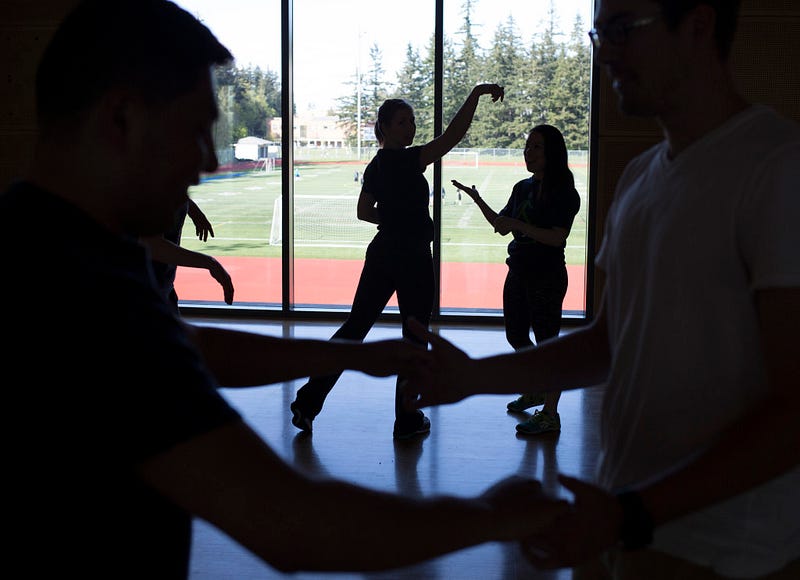Baby Steps
WWU’s First Step movement program
STORY BY MIRABELLE BLECH | PHOTOS BY JAKE PARRISH
I gave up climbing stairs my freshman year at Western. While living in the dorms and getting to know the campus and surroundings, I developed chronic knee pain — searing, I-want-to-cry-but-am-in-public pain. After nearly half a dozen doctors’ appointments to figure out what was happening to me, I was diagnosed with chondromalacia patella: runner’s knee. This was a surprise, as I am not a runner, but tell that to my angry kneecaps. I spent my first winter break in college attending physical therapy.
Physical injury can happen to anyone for any number of reasons. For example, approximately 88 percent of college musicians develop a playing-related injury, according to a 2000 study in the journal Medical Problems of Performing Artists. Injury can severely limit mobility or motivation for movement, and busy university students may not always have time to stop and deal with pain or discomfort, even if it is hindering their lives. The Wade King Student Recreation Center offers a way to address this issue: the First Step program.
Housed in an unassuming section of the recreation center — past the rock wall and attendant desk, neighboring the MAC Gym — is the Injury Rehabilitation Clinic. This small, quiet room is a world away from the bright, full-tilt, sometimes-quixotic atmosphere of the rest of the recreation center environment. This clinic, along with longer-term and athlete-specific physical therapy, is where the First Step journey begins.
First Step is a program created by campus recreation clinical athletic trainer Lori deKubber, a Western alumna who has been working as a trainer at the university for 25 years. After moving from the Student Health Center to campus recreation in 2012, deKubber found a void to fill.
“In injury rehabilitation [work], I noticed a gap between treating an injury and some of the other ways that people get exercise and other activity in their life,” deKubber says.
When she recognized the many people who fell into that gap, deKubber sought to provide a service to fulfill that need. First Step was born in 2012. Since then, approximately 20 people per quarter have used the program, which is free to all Western students and staff.
The First Step program is implemented in several stages.
First is an initial muscular-skeletal evaluation to determine any physical limitations or other bodily concerns, which addresses what the client wants to be able to do, activity-wise. This involves a series of tests checking flexibility and movement patterns, including a walking simulation wherein the client holds a bamboo rod across their shoulders, Mulan-training-montage-style, and carefully steps over a mini-hurdle placed in front of them, touching their heels to the ground.
Then, clients have three personalized sessions, each an hour long, with a trainer who works solely with that individual for their time in the program. For example, if a client has chronic knee pain but wants to be able to have the improved mobility to go on hikes, the team will focus on strengthening or flexibility exercises addressing the movement patterns found in the assessment examination.

By the last session, the trainer and client have formed a regimen that the client can hopefully continue with on their own, ranging from series of stretches and strengthening exercises to embarking on a new type of movement activity. First Step also facilitates connections to other campus groups and services (such as personal training beyond the program or joining intramurals) that can fulfill client goals, as well as any necessary program follow-up needs.
All eight trainers are kinesiology students who have been personal-trainer certified and selectively hired for the program. This hands-on experience with training is beneficial for students who want to stand out in an academic field that has seen substantial growth across the nation. The American Kinesiology Association estimates that the number of undergraduate majors grew 50 percent from 2003 to 2008, according to an article from Inside Higher Ed, a professional educator development and news website.
Western senior Marina Stoermer is a pre-healthcare kinesiology student and is the lead trainer in the Injury Rehabilitation Clinic. Stoermer is in charge of organizing First Step Wednesday activities, weekly hour-long classes with a social, non-competitive movement focus, to encourage participants to engage without barriers such as the fear of pressure or comparison. Interested community members can participate, even if they are not currently enrolled in the individual First Step program. Activities vary from pool days and dancing to hide-and-seek and jump-roping.
Both deKubber and Stoermer are emphatic about the program’s holistic and sustainable practices.
“We want people to find activities they can do for the rest of their lives,” deKubber says. deKubber says having fun with body movement is something highly stressed throughout the program.
Stoermer says that there is a preconceived notion that exercise has to be hard or uncomfortable.
“[Exercise] should be fun movements you love to do — pickleball, dancing, swimming, knitting — anything you would want to keep doing,” Stoermer says.
The program focuses on any movement activities that clients like or are interested in, rather than a difficult or tedious approach to exercise, deKubber says. Restrictive ideas of ideal activities, weights, body types and eating habits such as fad dieting can present issues, she says.
“We just don’t buy into that,” she says. “We want to spread information that is empowering, rather than shaming. [Empowerment] is a main goal of ours.”
Whether someone wants to climb stairs or climb a mountain, the people in the First Step program want to help members of the Western community get moving and keep going.